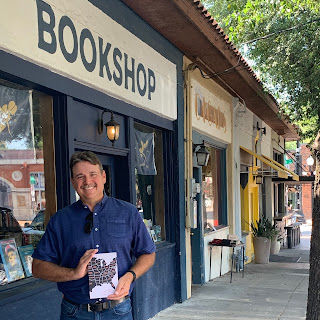Since I’m tied to my daughter’s softball schedule, I can’t set up book tours like some authors do. Instead, I try to time my introductions with her tournament schedules, emailing or calling a few weeks in advance to set up a book signing or book drop.
The results are mixed. Some independent bookstores can’t be bothered. Others are aggressively disinterested as if someone taking an interest in their store is somehow bad. But then there are a few who are enthusiastically receptive. They know what their customers like and signed copies are easy to sell.
As an introvert, I prefer emailing or messaging bookstores over placing a call but calling is almost always better. I’m still surprised by how many bookstores neglect their Facebook pages and Instagram accounts. (One bookstore even contacted me three weeks after my area visit and arranged to have me ship books instead.) And when a Barnes & Noble employee suggests you email a store manager instead, I’m convinced the address is akin to digital purgatory.
One of my favorite signed book drops occurred in the Bishop Arts District of Dallas, Texas. The store manager, Alan Yanes, was very receptive to having me visit and drop off a few signed books at his store. He was very understanding, too, knowing that we were restrained to the timeframes of the summer softball camp that my daughter was attending in nearby Fort Worth.
Poets Oak Cliff is a small, meticulously curated bookstore owned by writer and poet Marco Cavazos, and managed by a wizard of books and customer service. As fate would have it, Alan is also a Las Vegas native. So, he was especially interested in having an author from Las Vegas visit the store.
Since my visit to Poets Oak Cliff was in the summer, ahead of my release date for Third Wheel, I only had a few trade paperback copies of 50 States with me. Alan took them all. He loved the idea of 50 short stories with one story set in each state. Like many people, he read the story set in his home state first. Later, he read the one linked to Texas.
It was never my intention for 50 States to be read that way, but it’s reflectively common that readers turn to their home states first (or the ones they’ve lived in). Sometimes the story they read first dictates how well they enjoy the rest of it. The harshest criticism I ever received was from a New Mexico native. New Mexico is the shortest story in the book, and he felt I sold his state short. The irony is that there is plenty more to the New Mexico story. I just haven’t finished writing it. (I might finish the next installment for my newsletter in March. We’ll see.)
Shortly after acquiring copies for the store, Alan staged a couple books on the shelf. They were placed in good company, Bukowski’s Ham on Rye to the immediate right. I saved that image to my computer’s browser as a backdrop, replacing the one I took at Bookends in Hawaii.After the visit, my daughter and I toured the Bishop Arts District. The area has more than 60 independent boutiques, restaurants, bars, and coffee shops in the area. It’s a pretty cool place, steeped in history. From what I understand, it was once the site of Dallas’ busiest trolley stops in the 1930s. I can’t wait to visit again. There was more to explore than we had time for because we had to catch a flight home.
Poets Oak Cliff sold out of 50 States in a few days, and Alan ordered more from one of our distributors, IngramSpark. Copies of 50 States are selling briskly, he texted me.
I don’t think he had any idea how much I appreciated it. I told him so but then went a step further by picking up an advanced copy (signed) of Naked Gulls by Marco Cavazos. I loved it, finding it delightfully surprising. It’s a surreal read, breaking from the rules of reality. I reviewed the Hotel California-esque story about a writer who can’t remember checking into a hotel and isn’t allowed to check out, giving it a well-deserved five stars. A couple lines from my review eventually landed in his newsletter.
As it turns out, Marco isn’t the only writer at the bookstore. Although Alan is still working on his manuscript, he had a solid concept in production. I learned a little bit about it when he was in Las Vegas visiting family. We met in a French bakery for a coffee and talked about books, bookstores, and publishing. What else would two bibliophiles do?
We also discussed a return visit to Dallas, specifically for a book signing event, as Poets Cliff Oak was one of the first bookstores to stock my debut novel, Third Wheel. I intend to take them up on it, too. As soon as my daughter’s softball schedule wraps up with a college commitment, my travel plans will be significantly more flexible.
This is what I mean by something special. There is a natural synergy between an author promoting an indie bookstore and a bookstore helping to promote an author they appreciate. Doubly so, in that I’ve also become a fan of the owner’s work because his manager was friendly enough to extend an invitation in the first place, recognizing that authors are also customers.
Whenever you are in the Dallas area, make it a point to visit the Bishop Arts District. Along the outer edge of it is one of my favorite bookstores in the country. Who knows? Maybe we can meet up there in some yet undefined month ahead for a proper book signing.




















